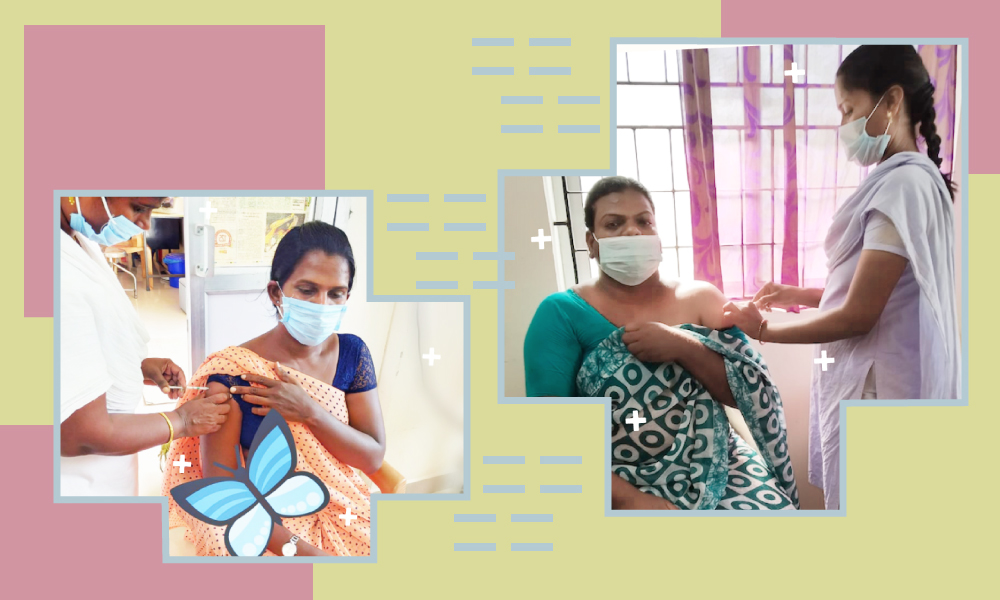
Suchitra Dey, a teacher from Kolkata and a trans woman, spends her days at home, following all COVID-19 protocols strictly, and doesn’t plan to go out even when the lockdown is lifted. When asked if she will get vaccinated so she can resume some semblance of normalcy, she immediately refuses. “I’m afraid of what may happen after I take the vaccine. A neighbour of mine fell very ill after taking the shot and a colleague of mine was hospitalized with severe infection. So, I want to wait because I don’t know how effective it will be,” Dey told Re:Set.
Dey is one of many from the transgender community who are skeptical of the COVID-19 vaccine, for multiple reasons, primary being the side effects of the vaccine. According to Dr. Aqsa Shaikh, the first transgender doctor to head a COVID-19 vaccination center in Delhi, many trans people worry that the vaccine may interfere with other treatments such as the one for HIV or the hormone therapy many undergo as part of gender reassignment procedures. Some of these procedures can cause the person to have a weakened immune system, further raising fear of side effects. But according to UNAIDS, the vaccine has no such adverse effects on those living with HIV. And while there is no scientific proof that the vaccine interferes with these treatments, there is also hesitation as the vaccine trials did not include a significant number of transgender people.
Shaikh, who is also the founder of the Human Solidarity Foundation, a charity that helps the underprivileged, goes on to explain that apart from these specific concerns, they are also worried about the general side effects from the vaccine that include fever and body ache. “Many transgender people don’t have stable support systems, so if they do experience side effects, they worry about losing out on work and having nobody to take care of them,” she said.
For a community that has largely been ostracized, a part of India’s transgender population live hand-to-mouth, and since the lockdown and the pandemic have already affected their daily survival, getting vaccinated is an unfeasible option, Dey said.
The government, on the other hand, is doing little, in the form of campaigns and vaccine drives, to dispel their fears, fueling the growing vaccine hesitancy and hence, leaving many trans people out of the vaccination drives. As of last month, less than 4% of the community has been inoculated.
“We get to see news on WhatsApp and on TV that also increases our fear. Like the other day I read a news article that said everyone who has been vaccinated will die in the next two years. I know it’s not true now, but when I first read it, it was scary,” Dey said.

According to artist and trans rights activist Kalki Subramaniam, fake news such as that coupled with lack of awareness is one of the major roadblocks in getting the population vaccinated. “While the transgender community is well-informed about the virus and the safety precautions against it, they have very little information about the vaccines that fight it. This leads to a lot of vaccine hesitancy,” she told Re:Set, adding that at a recent vaccination drive in Coimbatore, where a hospital was offering 50 slots to a local trans community, only eight people signed up for it.
Another hindrance is the lack of proper identification to register for the jab. The transgender community has long fought for recognition as a gender in India, which only happened as recently as 2014. Given slow bureaucracy and apathy toward the community, many transgender people still struggle to change their gender on ID cards or even apply for essential documents such as Aadhar, PAN, and ration cards. “Many transgender people change their names when they are transitioning, and their new name and gender is not reflected on their Aadhar or ration cards because it’s difficult for them to access online systems or government offices to get it changed,” Shaikh explained.
The COVID-19 vaccine registration form only gives the option of ‘other’ in the gender category, which alienates them as it fails to recognize them as a specific gender, Shaikh added. “Why should it be ‘other’? Why can’t they say ‘transgender?’ This further discourages us from getting help,” she said.
To fill this gap in access to information and technology, NGOs and activists have been educating, raising awareness and helping transgender communities get registered for the vaccine. Chennai-based non-profit Periferry recently collaborated with trans rights organizations SAATHI and Sahodaran to start the #OosiPodu vaccine campaign, where they organized programs for local communities to dispel doubts and answer any questions surrounding the vaccine.
Saran, a 29-year-old trans man and associate with Periferry, told Re:Set while there is a lot of reluctance from the community, it is independent outreach programs that actually help. “We depend a lot on social workers for our survival. Lockdown means it is harder for us to work and access aid. Many transgender people don’t have proper ID proof and don’t know how to get it. Social workers save us by helping with this,” he said. Saran added that while he was apprehensive at first, he now hopes to get his first shot soon, when his local center has enough doses.






















Write a comment ...